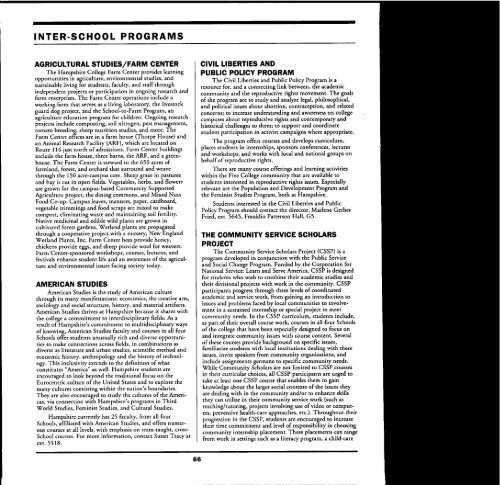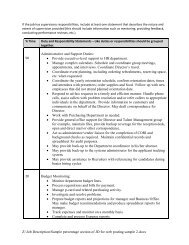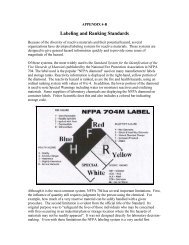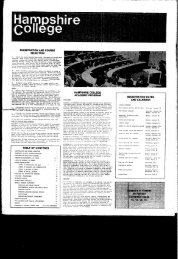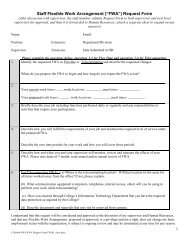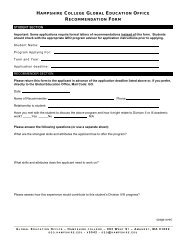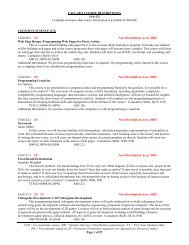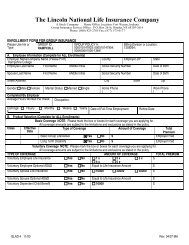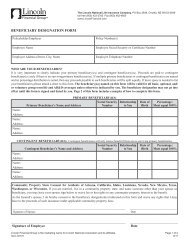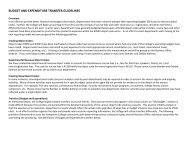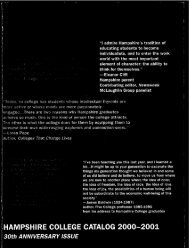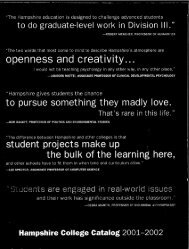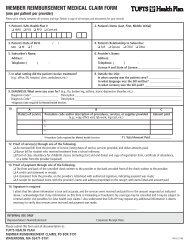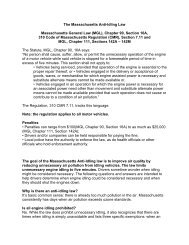school of social science - Hampshire College
school of social science - Hampshire College
school of social science - Hampshire College
Create successful ePaper yourself
Turn your PDF publications into a flip-book with our unique Google optimized e-Paper software.
INTER-SCHOOL PROGRAMS<br />
AGRICULTURAL STUDIES/FARM CENTER<br />
The <strong>Hampshire</strong> <strong>College</strong> Farm Center provides learning<br />
opportunities in agriculture, environmental studies, and<br />
sustainable living for students, faculty, and staff through<br />
independent projects or participation in ongoing research and<br />
farm enterprises. The Farm Center operations include a<br />
working farm that serves as a living laboratory, the livestock<br />
guard dog project, and the School-to-Farm Program, an<br />
agriculture education program for children. Ongoing research<br />
projects include composting, soil nitrogen, pest management,<br />
tomato breeding. sheep nucrition studies, and more. The<br />
Farm Center <strong>of</strong>fices are in a farm house (Thorpe House) and<br />
an Animal Research Facility (ARF), which are located on<br />
Route 116 just north <strong>of</strong> admissions. Farm Center buildings<br />
include the farm house, three barns, the ARF, and a greenhouse.<br />
The Farm Center is steward to the 650 acres <strong>of</strong><br />
farmland, forest, and orchard that surround and weave<br />
through the 150 acre-campus core. Sheep graze in pastures<br />
and hay is cut in open fields. Vegetables. herbs, and flowers<br />
are grown for the campus-based Community Supported<br />
Agriculture project. the dining commons, and Mixed Nuts<br />
Food Co-op. Campus leaves. manures, paper. cardboard,<br />
vegetable trimmi ngs and food scraps ate mixed to make<br />
compost. eliminating waste and maintaining soil fertility.<br />
Native medicinal and edible wild planes are grown in<br />
cultivated forest gardens. Wetland plants are propagated<br />
through a cooperative project with a nursery. New England<br />
Wetland Plants, Inc. Farm Center bees provide honey.<br />
chickens provide eggs, and sheep provide wool for weavers.<br />
Farm Center-sponsored workshops, courses, lectures, and<br />
festivals enhance student life and an awareness <strong>of</strong> the agriculture<br />
and environmental issues facing society today.<br />
AMERICAN STUDIES<br />
American Studies is the study <strong>of</strong> American culture<br />
through its many manifestations: economics. the creative arts,<br />
sociology and <strong>social</strong> structure, history. and material artifacts.<br />
American Studies thrives at <strong>Hampshire</strong> because it shares with<br />
the college a commitment to interdisciplinary fields. As a<br />
result <strong>of</strong> <strong>Hampshire</strong>'s commitment to multidisciplinary ways<br />
<strong>of</strong> knowing. American Studies faculty and courses in all four<br />
Schools <strong>of</strong>fer students unusually rich and diverse opportunities<br />
to make connections across fields, in combinations as<br />
diverse as literature and urban studies, scientific method and<br />
economic history. anthropology and the history <strong>of</strong> technology.<br />
This inclusivity extends to the definition <strong>of</strong> what<br />
constitutes "America" as well. <strong>Hampshire</strong> students are<br />
encouraged to look beyond the traditional focus on the<br />
Eurocemric culture <strong>of</strong> the United States and to explore the<br />
many cultures coexisting within the nation's boundaries.<br />
They are also encouraged to study the cultures <strong>of</strong> the Americas,<br />
via connection with <strong>Hampshire</strong>'s programs in Third<br />
World Studies, Feminist Studies, and Cultural Studies.<br />
<strong>Hampshire</strong> currently has 25 faculty, from all four<br />
Schools, affiliated with American Studies, and <strong>of</strong>fers numerous<br />
courses at all levels, with emphasis on team-taught, cross<br />
School courses. For more information, contact Susan Tracy at<br />
ext. 5518.<br />
66<br />
CIVIL LIBERTIES AND<br />
PUBLIC POLICY PROGRAM<br />
The Civil Liberties and Public Policy Program is a<br />
resource for, and a connecting link be£ween, the academic<br />
community and the reproductive rights movemem. The goals<br />
<strong>of</strong> the program are to study and analyze legal, philosophical.<br />
and political issues about abortion, contraception, and related<br />
concerns; to increase understanding and awareness on college<br />
campuses about reproductive rights and contemporary and<br />
historical challenges to them; to support and coordinate<br />
student participation in activist campaigns where appropriate.<br />
The program <strong>of</strong>fers courses and develops curriculum.<br />
places students in internships, sponsors conferences, lectures<br />
and workshops, and works with local and national groups on<br />
behalf <strong>of</strong> reproductive rights.<br />
There are many course <strong>of</strong>ferings and learning activities<br />
within the Five <strong>College</strong> community that are available to<br />
students interested in reproductive rights issues. Especially<br />
relevant are the Population and Development program and<br />
the Feminist Studies Program, both at <strong>Hampshire</strong>.<br />
Students interested in the Civil Liberties and Public<br />
Policy Program should contact the director. Marlene Gerber<br />
Fried. ext. 5645. Franklin Parterson Hall. G5.<br />
THE COMMUNITY SERVICE SCHOLARS<br />
PROJECT<br />
The Community Service Scholars Project (CSSP) is a<br />
program developed in conjunction with the Public Service<br />
and Social Change Program. Funded by the Corporation for<br />
National Service: Learn and Serve America. CSSP is designed<br />
for students who wish to combine their academic studies and<br />
their divisional projects with work in the community. CSSP<br />
participants progress through three levels <strong>of</strong> coordinated<br />
academic and service work, from gaining an introduction to<br />
issues and problems faced by local communities to involvement<br />
in a sustained internship or special project to meet<br />
community needs. In the CSSP curriculum, students include,<br />
as part <strong>of</strong> their overall course work, courses in all four Schools<br />
<strong>of</strong> the college that have been especially designed to focus on<br />
and integrate community issues with course content. Several<br />
<strong>of</strong> these courses provide background on specific issues.<br />
familiarize students with local institutions dealing with these<br />
issues. invite speakers from community organizations. and<br />
include assignments germane to specific community needs.<br />
While Community Scholars are not limited to CSSP courses<br />
in their curricular choices. all CSSP participants are urged to<br />
take at least one CSSP course that enables them to gain<br />
knowledge about the larger <strong>social</strong> contexts <strong>of</strong> the issues they<br />
are dealing with in the community andlor to enhance skills<br />
they can utilize in their community service work (such as<br />
teachingltutoring. projects involving use <strong>of</strong> video or computers,<br />
preventive health-care approaches, etc.). Throughout their<br />
progression in the CSSP. students are encouraged to increase<br />
their time commitment and level <strong>of</strong> responsibility in choosing<br />
community internship placement. These placements can range<br />
from work in settings such as a literacy program, a child-care


